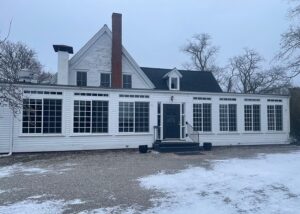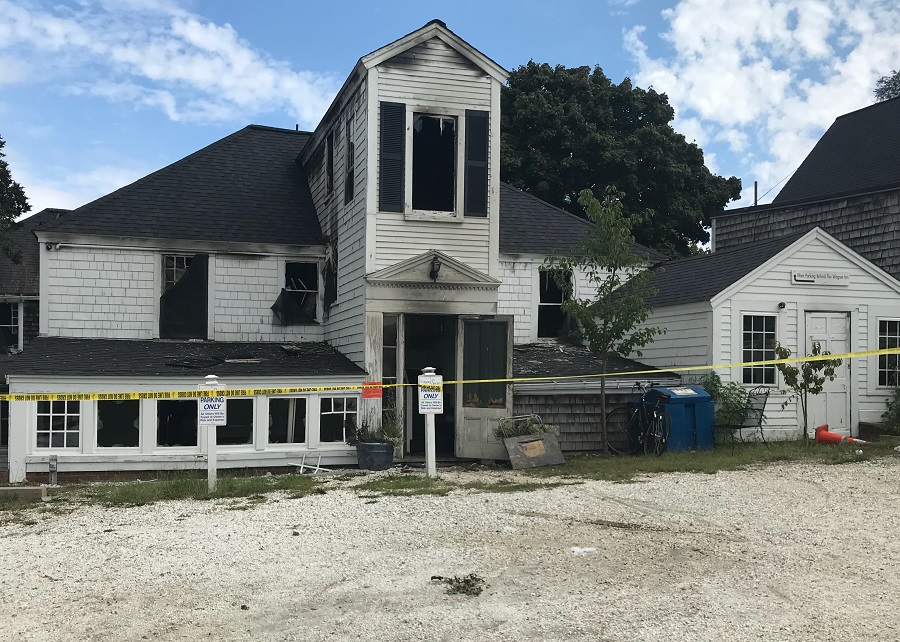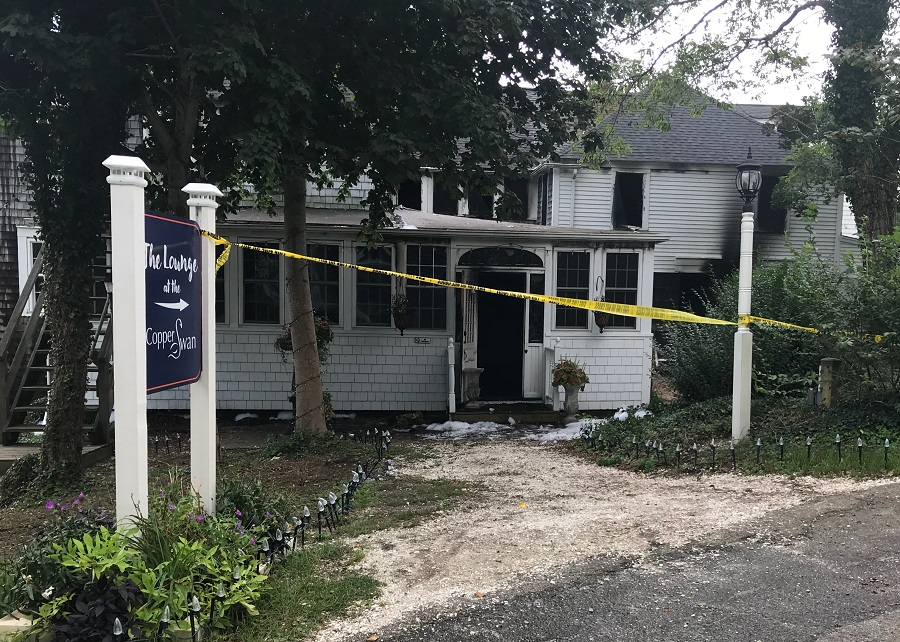WELLFLEET — John O’Toole and Grant Hester were newly married and living in Provincetown when they bought the historic inn and restaurant at 70 Main St. here in April 2022. They had big dreams.

The $3,145,000 purchase was made with the help of two mortgages. The couple borrowed $1.6 million from Seamen’s Bank and secured a Small Business Administration loan for $1 million from Coastal Community Capital.
Less than three years later, the mortgages are in default, and the property is going back on the market as part of a bankruptcy filing.
A month after the purchase, O’Toole and Hester’s initial plans were relatively modest, calling for putting new roofs on each building and planting some flowers to enhance curb appeal. “Right now, we will focus on being open, friendly, and kind,” O’Toole told the Independent for an article about the couple’s plans in May 2022.
Asked about the future of the property last week, O’Toole said he was unable to comment.
The five-acre property, located just outside the town’s center, has several buildings between 100 and 200 years old. While the rich history of the place was something the couple found attractive at the time of their purchase, the age of the buildings contributed to the woes they endured afterward.
O’Toole and Hester operated the 22-room Copper Swan Inn, booking rooms in the main house, an adjacent cottage, and a carriage house. They leased the restaurant space on the property to Trudy Vermehren, who moved her Fox & Crow Café there from its corner spot on Commercial Street.

The café, which quickly became a popular year-round gathering spot, operated in its new location only from mid-2022 to September 2023. The relationship between Vermehren and her landlords was contentious almost from the start, with disputes about the deteriorated condition of the buildings and over finances.
Workers at the restaurant were housed in an adjacent building, which had been constructed by an amateur builder who owned the property in the 1930s from wood he scavenged from old barns. Vermehren complained that the worker housing had broken windows, missing screens, and locks that didn’t work. When the fire chief inspected it, he removed a stove from a small bedroom that had been converted to a kitchen, saying it was a fire hazard. The workers were left with no stove. Vermehren complained that both her café and the employee housing frequently lacked hot water.
In July 2023, O’Toole and Hester served Vermehren with an eviction notice, claiming she owed them one month’s rent on the restaurant along with $8,000 for the employee housing she was leasing. As the landlords moved forward with the eviction in Orleans District Court, Vermehren’s lawyer, Bruce Bierhans, sued O’Toole and Hester, seeking damages for Vermehren’s loss of investment in the restaurant, loss of employees, and loss of business.
The eviction became moot when Vermehren moved out in late September. The damages suit is still pending in Barnstable Superior Court.
Challenges continued for O’Toole and Hester with a fast-moving fire in September 2023 that destroyed the large building that included the employee housing as well as a lounge just opened by the couple.

While insurance paid close to $1 million for the fire damage, Seamen’s Bank, which was overseeing its distribution, declined to release the money until O’Toole and Hester provided a definitive plan for repairs as well as cost estimates. Seamen’s foreclosed on the mortgage in the summer of 2024 when it had not received monthly payments from O’Toole and Hester and scheduled an auction of the property.
O’Toole and Hester filed for Chapter 11 bankruptcy on Aug. 5 to prevent the auction. The bank then applied the $910,000 balance of the insurance proceeds toward the mortgage principal, bringing the owners’ debt to about $789,000, counting late charges and interest.
The couple also owes the $1,026,000 principal for the small business loan. In December 2024, the bankruptcy was moved from Chapter 11 restructuring, which requires the debtor to make monthly payments on debt, to Chapter 7 bankruptcy, used when a debtor is unable to make payments. A trustee is then appointed by the bankruptcy court to convert the debtor’s assets into cash to pay off creditors.
Earlier this week, the U.S. Bankruptcy Court agreed to award John Ciluzzi, president of Premier Commercial, the exclusive contract to sell the property. Ciluzzi confirmed his role but declined to say when the listing would be advertised and what the asking price will be.
Once the property is sold, creditors, including the town if there are outstanding real estate taxes, will be paid in full. Once the debt is fully cleared, O’Toole and Hester would get any remaining money.
Robert “Moo” Morrill, president of the Wellfleet Chamber of Commerce, said the loss of Vermehren’s year-round restaurant was a blow to the town. The fire damage may complicate the sale, but Morrill remains hopeful the place will see new life.
“It’s difficult but not impossible,” Morrill said, to create a thriving business from a foreclosure sale on a property that needs some love.
Morrill speaks from experience. He and his wife, Judy, purchased the same 70 Main St. property now being foreclosed for $200,000 in a foreclosure sale in 1980.
“We enjoyed it very much,” he said of running their Duck Creeke Inn and Sweet Seasons restaurant for over 30 years. “With this owner, it was unfortunate. It just didn’t work.”
In 2015, the Morrills sold the property for $2.5 million to Erica Chapman, a vice president at PepsiCo, and Leo Wagner, who completed some renovations before selling it to O’Toole and Hester in 2022.




